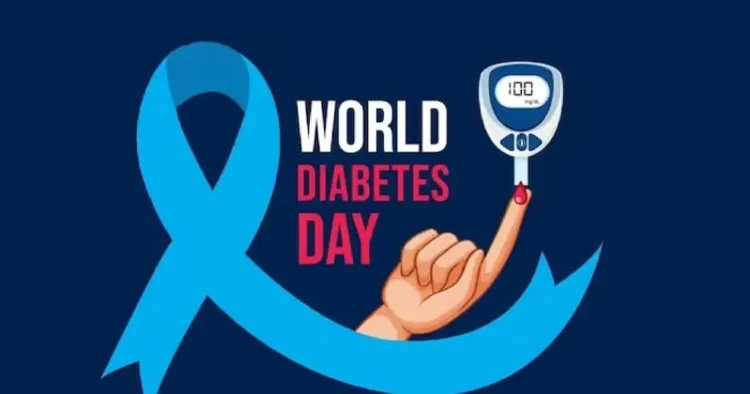Step Up for Diabetes: CSOs Urgent Call to Action on World Diabetes Day 2024
An estimated 537 million adults aged 20–79 years are currently living with diabetes. This represents 10.5% of the world’s population in this age group. According to WHO's Global Diseases Compact, the total number is predicted to rise to 643 million (11.3%) by 2030 and to 783 million (12.2%) by 2045.
- Advertisement -
As we observe World Diabetes Day (WDD) 2024, the Ghana NCD Alliance together with the Vision for Accelerated Sustainable Development, and Generational Growth Foundation among others joins the global community to advocate for effective policies that ensure that people living with diabetes are receiving the needed healthcare including affordable but quality essential medicine. The CSOs also aimed to raise awareness about diabetes and its health, economic and social impact on individuals and communities and the economy of Ghana. Commemorated annually on 14th November, WDD serves as a crucial platform for advocacy, education, and action against diabetes, highlighting the urgent need for a comprehensive approach to managing this growing health crisis.
This year’s campaign, running through 2024-2026, is centered around the theme “Diabetes and Well-being,” focusing on three essential pillars: physical well-being, societal well-being, and mental well-being. The emphasis on physical well-being underscores the significance of regular physical activity and the adoption of healthy diets. These lifestyle choices are instrumental in reducing the risk of type 2 diabetes and effectively managing all forms of diabetes along with their associated complications.
- Advertisement -
Furthermore, our commitment to societal well-being aims to highlight the barriers that individuals living with diabetes encounter, which often hinder their ability to lead healthy and fulfilling lives. As a nation, we must address these obstacles—such as inadequate healthcare access and societal stigma—to create a more supportive environment for all those affected by this condition.
- Advertisement -
Additionally, focusing on mental well-being acknowledges the emotional challenges, stress, and anxiety often associated with managing a chronic disease like diabetes. By raising awareness of the mental health aspects of diabetes, we seek to integrate these considerations into comprehensive management and treatment plans that support the whole person—not just their physiological needs.
Key Findings from the Ghana STEP Survey on Diabetes indicate that 70.3% of adults aged 18-69 have never had their blood glucose levels checked. Only 1.9% of the population has been diagnosed with diabetes in the past twelve months. Regarding insulin medication, only 15.4% of those diagnosed with diabetes are on it, and 34.6% are on other prescribed medications. These statistics highlight the urgent need for increased diabetes screening and improved access to treatment in Ghana.
An estimated 537 million adults aged 20–79 years are currently living with diabetes. This represents 10.5% of the world’s population in this age group. According to WHO’s Global Diseases Compact, the total number is predicted to rise to 643 million (11.3%) by 2030 and to 783 million (12.2%) by 2045.
The increasing prevalence of diabetes in Ghana is a major health concern, fueled by rising rates of obesity, unhealthy diets, and sedentary lifestyles. According to the World Health Organization, diabetes incidence in Ghana has surged by 21% over the past decade. This upward trend calls for immediate and coordinated action to prevent further escalation of diabetes cases in the country. Access to essential healthcare services is another pressing issue, especially in rural areas where many Ghanaians lack the means to receive timely diabetes screenings and care. The absence of specialized healthcare facilities leads to late diagnoses and complications that could have been prevented with earlier intervention. Addressing these gaps in access is crucial to managing the diabetes crisis in Ghana.
Public awareness and education on diabetes remain insufficient. Many Ghanaians are not fully aware of the risk factors, symptoms, and management strategies for this condition. To bridge this gap, a comprehensive education campaign is needed to inform the public about lifestyle changes and empower them to make better healthcare decisions, thereby reducing the incidence and impact of diabetes across the country.
Mental health support is crucial, as diabetes affects more than just physical health; it also has a significant impact on mental well-being. Patients often face psychological challenges, and incorporating mental health support into diabetes care can enhance overall treatment outcomes. A holistic approach that considers mental health as part of diabetes management would be instrumental in improving the quality of life for those affected.
Diabetes affects more than just physical health; it also has a significant impact on mental well-being. Patients often face psychological challenges, and incorporating mental health support into diabetes care can enhance overall treatment outcomes Strong policies that allocate resources for essential diabetes medications, testing supplies, and affordable access under the National Health Insurance Scheme (NHIS) would contribute significantly to reducing the disease burden. Improving understanding of diabetes, and how it can be prevented and treated, is vital. From better understanding the signs and symptoms of diabetes, to explaining nuances within diabetes, and what interventions are available, expanding education and health literacy at the community level is important for the integration of diabetes care into Universal Health Coverage (UHC)On this World Diabetes Day, we urge all stakeholders—including government agencies, healthcare providers, and civil society organizations to come together to strengthen diabetes care in Ghana. Let us create an environment that supports healthy lifestyle choices, enables early diagnosis, and ensures effective management of diabetes, so that no Ghanaian is left behind. World Diabetes Day is not just a reminder; it is a call to action for our nation to prioritize diabetes management and provide much-needed support for those affected.
Together, we can build a healthier future for all. Together, let’s act for diabetes management and care!
Labram M. Musah
- Advertisement -
National Coordinator
Ghana NCD Alliance
0243211854
For media inquiries, please contact:
Rhoda Aku Mingle
Communication Officer
Ghana NCD Alliance
0241136371
- Advertisement -


